Stakeholder Engagement
Stakeholders of the Daihatsu Group
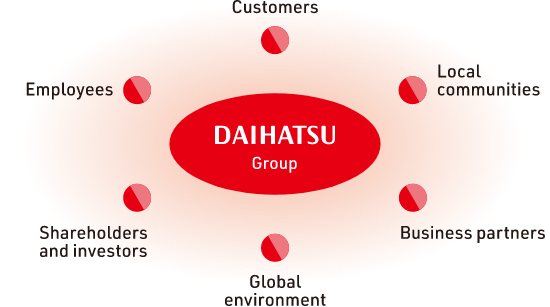
Daihatsu Sustainability Basic Policy
[Foreword]
We, at Daihatsu, comply with laws, regulations, and rules. We also uphold Corporate Philosophy of “Staying close to our customers and enriching their lives” as our mission. All of our employees contribute to the sustainable development of society through Daihatsu’s unique MONODUKURI and KOTODUKURI.
In addition, we are aware of our role as a corporate citizen, recognize the impact we have on society and the environment, and work with all stakeholders in good faith to deepen mutual understanding and foster long-term relationships of trust.
1. With our customers
◆ We, as a mobility company centered around compact cars that values the idea of staying close to our customers, provide safe, secure, high-quality products and services at affordable prices and enrich our customers’ lives.
◆ We strive to thoroughly protect the personal information of our customers, and of all people we encounter in our business activities.
2. With local communities
◆ We seek to become a company that has roots in the communities in which it operates. To this end, we respect local traditions, cultures, and customs and, through dialogue and cooperation with local parties, we contribute both to the resolution of societal issues and to the harmonious growth of local communities.
3. The global environment
◆ We believe that preserving the irreplaceable global environment for future generations is a responsibility shared by all humanity. We seek to minimize the environmental load of our business processes in every stage of our product lifecycles; at the same time, through the use of outstanding environmental technologies, we seek to realize a mobility society that places a lighter burden on the natural environment.
4. With our business partners
◆ We endeavor to coexist and co-prosper with our business partners through open and fair trade.
We also collaborate with our business partners and with industry groups to fulfill our societal responsibilities in every stage of our supply chain.
5. With our shareholders and investors
◆ We are committed to safeguarding the soundness and transparency of our management; at the same time, through proper and fair information disclosure and dialogue, we aim to improve our corporate value from a long-term perspective with our shareholders.
6. With our employees
◆ We respect the human rights of all the people we encounter in our business activities; at the same time, we seek to create environments in which all Group employees can work safely, healthily, and with energy and enthusiasm.
◆ We strive to create workplaces where employees get fairly evaluated; at the same time, we develop systems that enable employees to experience job satisfaction and achieve personal growth, and thereby foster an open company culture.
Customers
Daihatsu strives to stay close to customers and provide better products and services that reflect the opinions of customers through MONODUKURI and KOTODUKURI.
Communication with Customers
Daihatsu works to enhance means of communication, such as call centers and websites, with customers including individuals, businesses, and governmental agencies that are currently using Daihatsu vehicles as well as those who are considering purchasing a Daihatsu vehicle and also to provide accurate information in response to inquiries. We provide feedback on the opinions, requests, and indications received from customers to the relevant divisions and use this information as a tool for improving the quality of products and services and undertaking new initiatives.
Engagement with Customers through MONODUKURI
Daihatsu reflects knowledge gained through dialogue with customers in product planning and development. We conduct quantitative research, exemplified by questionnaire surveys, to identify the scale and distribution of market needs, and also engage as necessary in qualitative research, such as individual interviews of customers and observation of product use conditions. For example, we interview customers who are raising young children regarding issues that they have when using a vehicle with their children, leading to the adoption of new mechanisms to solve those problems. Also, specifically for commercial vehicles, our employees ride with customers in agricultural, forestry, and fisheries businesses to experience actual work with those customers, and incorporate product improvements based on real-world use environments.
To plan and develop vehicles optimized for customer needs not just in Japan, but in foreign markets as well, we are actively conducting wide-ranging market research.
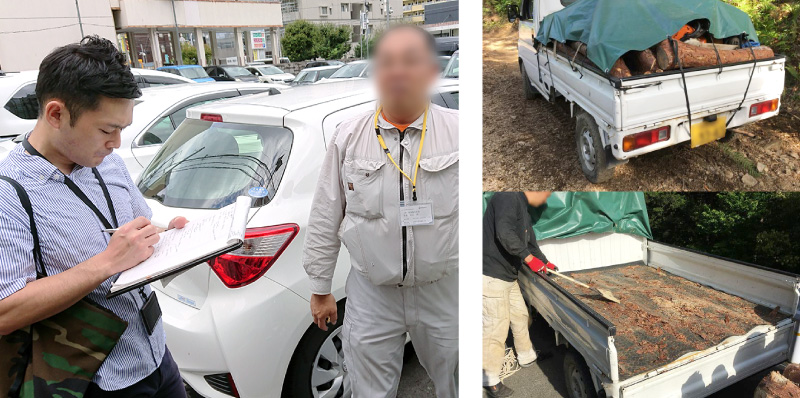 By visiting customers and listening to their stories directly, employees are able to gain an understanding of improvement and enhancement
By visiting customers and listening to their stories directly, employees are able to gain an understanding of improvement and enhancement
Engagement with Customers and Local Residents through KOTODUKURI
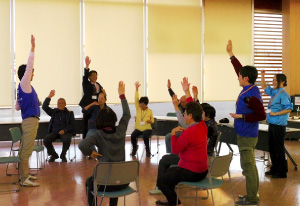 Health and safe driving courses
Health and safe driving courses
Daihatsu is expanding its contacts with customers and local residents and promoting KOTODUKURI that provides high experiential value. For example, we are responding to issues that Japan is confronting, such as a low birth rate, an aging population, and the necessity of regional revitalization, by taking measures with close ties to various regions including locally based projects that leverage Daihatsu’s strengths to provide customers with access to unrestricted mobility and independent lives no matter how old they become. Specific measures include regularly holding “health and safe driving courses” in various regions through collaboration among industry, government, academia, and local communities to reduce traffic accidents and support independent living by seniors as well as measures to reinforce engagement with customers and local residents through grassroots programs such as the “Daihatsu ABC Badminton National Primary School Tournament” and support for women’s soccer.
Employees, Local Communities, and Shareholders (Investors)
Daihatsu endeavors to create environments in which all employees can work with energy and enthusiasm while maintaining close ties with local communities and engaging in various activities with the aim of becoming a company firmly rooted in the local community.
Communication with Employees
Daihatsu created labor-management council bodies to accurately reflect worksite opinions in management and advance in the same direction based on a shared understanding of management issues between labor and management. Specific activities include monthly meetings held at each worksite to discuss work-related issues. We hold Labor-Management Council meetings four times each year, which share and discuss key issues from each worksite. At the meetings, the management team takes ownership of worksite issues, examines them, and works to create solutions. Through this process, labor and management strive to engage in two-way communication that fosters a sense of unity for the development of Daihatsu based on the principle of building relationships of mutual trust and responsibility between labor and management.
We also periodically issue internal newsletters to share information on Daihatsu’s initiatives and employees who work on those efforts with the aims of raising employee motivation and promoting communication.
 Labor-Management Council meeting
Labor-Management Council meeting
“Fureai-Hiroba” town hall meeting
The “Fureai-Hiroba” town hall meeting was established in July 2024 to provide opportunities for upper management and employees to engage in direct dialogue with one another. The objectives of the “Fureai-Hiroba” town hall meeting are to deepen employees’ understanding of the company’s management situation so that everyone is on the same page and can work as a team, to enable managers to receive direct feedback from the frontlines so they can rapidly implement management practices, and to improve employee motivation and job satisfaction. The in-person meetings are also made available online so that all officers and all employees can view them again at a later date. The forum venue rotates through the different business sites and was held four times in fiscal 2025.
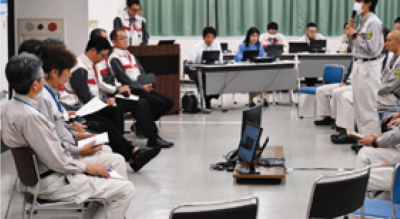
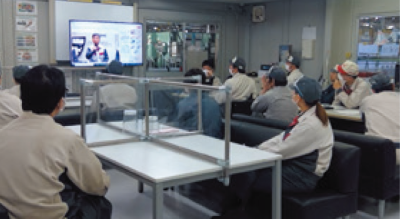
Communication with Local Communities: National and Local Governmental Agencies
Daihatsu proactively works in collaboration with governmental agencies to solve the problems faced by local communities. For example, in Ikeda City, the location of the Daihatsu Head Office, and Ryuoh-cho, the location of the Shiga (Ryuoh) Plant, we operate the Angel Vehicle Loan Program (Ikeda City, Osaka) and the Daihatsu Tatsunoko Family Car Provision Scheme (Ryuoh-cho, Shiga Prefecture), respectively, which loan vehicles free of charge for three years to families that have a certain number of children.
We are also involved in the crop-livestock farmers collaboration promoted by Ryuoh Town as an industrial partner. This team is promoting a project to develop and implement methane fermentation technology that utilizes the dung from Omi cattle, a local specialty. This initiative was selected for NEDO*’s “Commercialization Evidential Research and Development” program in fiscal 2021. Ryuoh Town’s Biomass Industrial City Concept, which is based around this project, was also selected in fiscal 2023 and is ongoing. Daihatsu was involved in the Biogas Project—the core of the concept—and built an evidential plant at the Shiga (Ryuoh) Plant 1st, utilizing unique automotive technology.
* NEDO: New Energy and Industrial Technology Development Organization
Communication with Local Communities: Nonprofit Organizations, etc.
Daihatsu works closely with nonprofit organizations (NPOs), which focus on social contribution activities, as we strive to deepen our engagement with local communities. For example, we provide support for the Himawarinokai NPO which works to benefit new and expectant mothers through activities such as ensuring there are priority parking spaces for such mothers at expressway service areas and other parking areas. We also provide support for the Ikeda Area Platform, working to revitalize the area around our local train station in our city of Ikeda, Osaka, by engaging with local shopping districts and students in community-based activities.
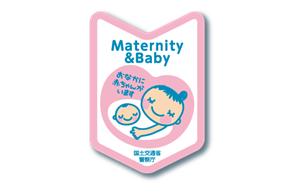 Maternity sticker for cars
Maternity sticker for cars
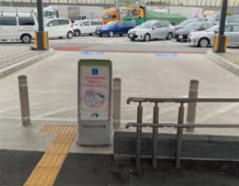 Priority parking spaces for expressway service areas and parking areas
Priority parking spaces for expressway service areas and parking areas
Shareholders (Investors)
Daihatsu is a wholly owned subsidiary of Toyota, and therefore, Toyota is Daihatsu’s sole shareholder. We see shareholders who have invested in Toyota as our own stakeholders and strive to enhance corporate value as a member of the Toyota Group by taking actions based on the Group Vision.
Suppliers and Memberships
In order to supply to customers high-quality but affordable vehicles equipped with advanced technology, Daihatsu builds relationships based on trust and structures that enable stable procurement of parts, materials, and equipment while developing mutually beneficial relationships with business partners.
Daihatsu Supplier CSR Guidelines
Daihatsu established the Daihatsu Sustainability Basic Policy as an expression of the Group’s fundamental stance on the activities of all Group employees. We recognize the importance of sustainability initiatives not only within the Daihatsu Group, but also at our suppliers. Accordingly, in consideration of changes in the domestic and overseas business circumstances, we have revised and issued the “Daihatsu Supplier CSR Guidelines” in January 2020 as a request for more specific initiatives.
Communication with Suppliers
Daihatsu provides information on our activities and priority initiatives to suppliers as appropriate through yearly policy briefings, monthly briefings, and other opportunities. On a daily basis, Daihatsu buyers and relevant departments visit the manufacturing site of each supplier to confirm the actual products firsthand, tirelessly engaging in dialogue on issues such as quality and cost improvement. Daihatsu also established the Daihatsu Suppliers Club (DSC) (approximately 620 companies) with the aims of promoting interaction among suppliers and creating opportunities for suppliers and Daihatsu to learn from each other. The DSC holds an annual meeting, and there are opportunities for managing companies to exchange ideas and opinions four times annually. At the annual meeting, Daihatsu also actively provides information, and participating companies form a consensus on the pursuit of mutually beneficial relationships by responding promptly to changes in the business environment.
At the Suppliers Appreciation Meeting held at the same time, we commend suppliers that made significant contributions to enhanced safety, quality, product appeal and cost competitiveness and express our gratitude, deepening engagement with suppliers. We also conduct study sessions for suppliers on measures for achieving carbon neutrality to establish a shared recognition and urge them to take specific action to reduce CO2 emissions. We provide information to suppliers on the Toyota Supplier Sustainability Guidelines, which we observe, and take action to ensure rigorous compliance.
Memberships
Daihatsu is a member of the Japan Automobile Manufacturers Association, Inc., Society of Automotive Engineers of Japan, Inc., Keidanren (Japan Business Federation), and various other trade organizations. We take a position of responsibility in each organization while gathering information through participation in committees and so on and participating in organizational decision-making.